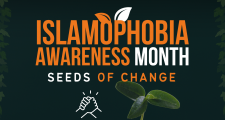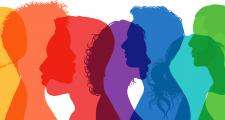IAM2024 | Seeds of Change

Islamophobia Awareness month is an opportunity to learn about the impact of Islamophobia across the globe. It is an opportunity to highlight how we can stand in solidarity with those who suffer intolerance, discrimination and violence primarily because they are Muslims, and challenge stereotypes and prejudices.
Islamophobia is a phenomenon based on assigning people a single identity, their Muslim faith, when faith is only one of the many aspects that can make up a person’s identity. It is a global phenomenon deeply entrenched in history. Islamophobia is rooted in European colonialism, Orientalism, and East-West dichotomy, often portraying negative images, and negative stereotypes of cultures to justify (colonial) ambitions. The continued rise of anti-Muslim rhetoric has exponentially increased in the 21st century, reflected not only in the ‘everyday’ lived experiences of individuals, but also manifested across political, structural and social contexts.
Across the world there has been a rise in acts of harassment, intimidation and violence towards people, based on their religious or beliefs, including against Muslims because of their faith (United Nations Office of the High Commission Statement March 2024). Examples include the treatment of the Uyghurs people, an ethnic group mainly from the northwestern region of China, including the use of “re-education camps”; the treatment of Rohingya people in Myanmar; the rising intimidation of Muslims in India; a growing number of European countries banning of religious symbols, including hijabs, for example in France and Belgium.
Global right wing populism, which exploits cultural and racial differences for political gain, has fuelled the rise and normalisation of Islamophobia. This has increased the use of hate speech and violent rhetoric in many countries and in international dialogues, continuing negative stereotyping of Muslims and Islam. Muslims are increasingly portrayed as ‘the villains.’ This exploits public discontent with divisive ‘us versus them’ rhetoric, leading to escalating attacks on the civil rights and freedoms of Muslims globally. Cultural difference slides into the demonisation and stigmatisation of ‘other’ cultures in the interests of protecting ‘us’ (the non-Muslim Self) from ‘them.’ This has resulted in continued discrimination and racially targeted violence. Anti-Muslim racism has increasingly been normalized, even celebrated in some cases worldwide, with extremist ideologies advocating the supremacy of certain groups have shifted from the fringes into the mainstream. Mass media, and especially social media, have played a critical role in the spread of and amplification of Islamophobia, providing a platform for anti-Islam and anti-Muslim sentiments.
The Rabat Plan of Action, initiated by the UN Office of The High Commission for Human Rights (OHCHR) (2012) is intended to complement human rights law provision, and includes a wide range of recommendation for how leaders and (social) actors can prevent incitement to violence and advocacy of national, racial or religious hatred and contribute to peace and stability. It recommends the adoption of anti-discriminatory national legislations and the empowerment of minorities and vulnerable groups to combat incitement to hatred. The Beirut Declaration “Faith for Rights” (OHCHR) 2017) considers that all believers – whether theistic, non-theistic, atheistic or other – should work together in articulating ways in which “Faith” can stand up for “Rights” more effectively so that both enhance each other. It sets out 18 commitments with corresponding actions: these include commitments to revisit religious interpretations that appear to perpetuate gender inequality and harmful stereotypes or even condone gender-based violence; to stand up for the rights of all persons belonging to minorities; and to publicly denounce all instances of advocacy of hatred that incites to violence, discrimination or hostility. Bringing together issues of faith and human rights provides a rights based approach, upholding the dignity and equal work of all and in fostering the development of a peaceful society.
The themes Islamophobia Month for 2024 is ‘Seeds of Change’ emphasising the importance of small actions as a contribution to larger changes and to celebrate the positive contribution of Muslims. As social workers we are know that human and social rights are intricately connected to religion, security and peace. Respect for human rights shapes societies that are more inclusive, peaceful, more resilient, and more sustainably developed. Understanding and acknowledging Islamophobic concepts and practices are fundamental if we are to challenge, question and deconstruct false ideologies and empower minoritised people and groups who Muslims are.
Discrimination and stereotypes based on religion or belief are doing harm as they dehumanise people and prevent them from enjoying their rights. We need to ensure we keep in mind the impact of ‘micro-aggression’ and intersectionality of the lives of people; for example, in recognising the life experiences of Muslim women as a multi-layered identity, including religiosity, without affecting their rights as being active agents in society. We are reminded that ‘[the] history of conflicts teaches us that people tend to focus more on what divides them than on what they have in common (OHCHR 2023:9).
We should centre the voices of people who are Muslims, gives them spaces to speak for themselves. As social workers we build knowledge and alliance, to construct stronger bonds between communities and challenge the divisive issues for society. We should continue to promote the global ethical principles of social work, to challenge hate speech and to provide mutual support and alliances to achieve these objectives and to support individuals, groups and communities facing challenging circumstances.
